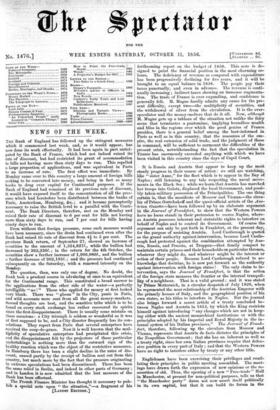NEWS OF THE WEEK.
THE Bank of England has followed up the stringent measures which it commenced last week, and, as it would appear, has THE Bank of England has followed up the stringent measures which it commenced last week, and, as it would appear, has now done its work effectually. It had been again in part antici- pated by the Bank of France, which had not indeed raised its rate of discount, but had restricted its grant of accommodation to bills not having more than sixty days to run. This repelled
a large proportion of applications, and was equivalent in Paris first an increase of .rate. The rst effect was immediate. By Monday came over to this country a large amount of foreign bills
seeking to be converted into money, and being in fact so many hooks to drag over capital for Continental purposes. If the Bank of England had remained at its previous rate of discount, it _would.have exposed itself to the concentrationaf all the pres- sure which had heretofore been distributed between the banks of Paris, Amsterdam -Hambarg, 4e. ; and it became peremptorily necessary to raise ihe British level to a parallel with the Conti- nent. The Bank Directors, therefore, met on the Monday and raised their rate of discount to 6 per cent for bills not having more than sixty days to run, and 7 per cent for bills having ninety days to ran.
Even without that foreign pressure, some such measure would have been necessary, since the drain had continued even after the Bank had raised its rate of discount from 411 to 5 per cent. The previous Bank return, of September 27, showed an increase of securities to the amount of 1,324,827/., while the bullion had decreased by 363,2301. ; in the return for the 4th October, the securities show a further increase of 1,966,0801., and the bullion a 'further decrease of 902,195/. ; and the pressure had continued subsequently on the Saturday, with a renewed intensity on the Monday.
The question, then, was only one of degree. No doubt, the Bank took a prudent course in advancing at once to an equivalent for the Continental range. This constituted a broad answer to the applications from the other side of the water—a perfectly intelligible " no ! " Those who applied for money at first looked very blank. There was " gloom " in the City, panic in Paris, and wild accounts were sent from all the great money-markets. Second thoughts are best, and the sensitive tribe which is to be found on every stock exchange has rather recovered its spirits since the first disappointment. There is usually some mistake on these occasions : a City triumph is seldom so wonderful as it was at first supposed to be, and a City disaster frequently has its con- solations. They report from Paris that several enterprises have received the coup-de-grace. Now it is well known that the mul- tiplicity of speculative enterprises had precipitated this crisis, and the disappointment felt by, the projectors of those particular undertakings is nothing more than the outward sign of the healthy reaction which was the object of the restrictive measures. In Hamburg there has been a slight decline in the rates of dis- count, caused partly by the receipt of bullion sent out from this country, but much more by the fact that the pressure originating in extreme speculations had been discontinued. There has been the same relief in Berlin, and indeed in other parts of Germany ; and in London it is now admitted that the last measure of the Bank has been effectual.
The French Finance Minister has thought it necessary to pub- lish a special note upon " the situation "—a fragment of his
forthcoming report on the budget of 1858. This note is de- signed to paint the financial position in the most charming co- lours. The deficiency of revenue as compared with expenditure has been progressively declining for five years, and it will be brought to an equal balance in 1858. The people pay their taxes punctually, and even in advance. The revenue is conti- nually increasing ; indirect taxes showing an immense augmenta- tion. The trade of France is ever expanding, and confidence is generally felt. M. Magne hardly admits any cause for the pre- sent difficulty, except two—the multiplicity of securities, and the withdrawal of silver from the circulation. It is the over- speculator and the money-melters that do it all. Now, although M. Magne gets up a tableau of the situation not unlike the fairy scene that terminates a pantomime, implying boundless wealth and bliss in the regions over which the good genius of France presides, there is a general belief among the best-informed in Paris as well as in this country, that the resources of the em- pire, the real extension of solid. trade, and the judgment-of those in command, will be sufficient to surmount the difficulties of the present crisis, notwithstanding the fact that the speculation in France has enormously exceeded anything with which we have been visited in this country since the days of Capel Court.


























